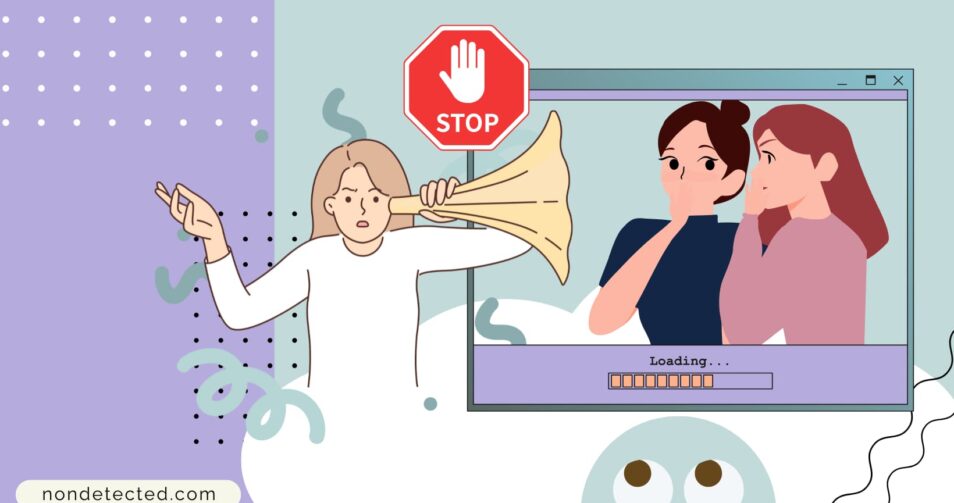How to Legally Stop Someone From Spreading Lies About You?

If you ever come across rumors online, you need to act quickly. The thing is that your reputation is at risk when someone spreads lies about you. Whether it is a personal grudge, malicious intent, or professional rivalry, when a person shares false content about you, the damage can be real and lasting. Rumours can result in lost business, emotional distress, and broken relationships.
This guide from NonDetected knows how to solve the issue, so our professional can share some information with you. You are welcome to get acquainted with the guide and use the offered tips.
Why Do False Rumors Matter?
You might wonder how to legally stop someone from spreading lies about you, but it is important to realize the consequences of the situation in the first place. The thing is that the harm from false statements online can be severe:
- Emotional distress. If you are a subject of lies, you will most probably experience anxiety and a sense of helplessness.
- Reputational damage. Lies tend to spread quickly and can be hard to correct. Customers, employers, and friends might believe false information.
- Professional harm. Defamatory posts or negative reviews can result in lost job opportunities, customer loss, and a tarnished brand image.
- Legal consequences. In some cases, lies can lead to legal complications or investigations.
Real-life example: A fitness coach was falsely accused on social media of providing unsafe workout plans. The claims were completely untrue, but they led to client cancellations and significant income loss. After taking legal steps and removing the defamatory content, the coach restored their business reputation and recovered lost clients.
So, What to Do If Someone Is Spreading Lies About Me?
As soon as you find out that some person spreading lies about you, you should come up with a strategy to solve the issue. There are several legal solutions to protect your reputation, but you should always consider your unique situation to make the best plan.
Further, you can find some advice from NonDetected on what to do when someone is spreading false rumors about you. It should help you come up with your own strategy.
Step 1: Get Those Lies Documented
Before you do anything, you should document everything. It means that you need to note the URLs, take screenshots, and record dates and times. This evidence is critical if you are willing to report the content or pursue legal action.
Sadly, when it comes to online content, there is always a possibility that the defamatory material will be erased. If you preserve a copy, you can prove the issue for a defamation lawsuit. The thing is that it is going to be much harder to pursue a defamation claim if you have no evidence.
Step 2: Get in Touch With the Person Responsible
In some cases, direct communication can solve the problem. If you are able to do that, you should contact the individual who is spreading lies and ask them to stop doing that and delete the content.
You should consider, though, that the person might refuse or escalate the situation. At this point, you should stop engaging further and move to the next step.
Step 3: Report the Content
Can you report someone for spreading rumors? The bigger part of online platforms have policies against defamation, harassment, and false information. Therefore, you can report an individual for spreading rumors directly on the platform.
These online services allow their users to report:
- Instagram, Facebook, and Twitter. You can use the report feature for comments, posts, and profiles.
- Google Reviews. This one allows reporting reviews that violate policy or are false.
- YouTube. Here, you can report defamatory comments or misleading videos.
- Web Hosts. You may contact the host and request removal if the information is on a private website.
When you report on these platforms, you should include clear explanations and screenshots. It is also a good idea to refer to the website`s specific rules about harassment or defamation.
Example: A small e-commerce store faced a smear campaign from a competitor via fake negative reviews. After reporting them to Google and providing evidence, the reviews were removed, and the competitor was banned from leaving reviews on Google.
Step 4: Send a Cease-and-Desist Letter
When thinking about what to do if someone is spreading rumors about you, you should consider that you can send a cease-and-desist letter. This formal letter demands that individuals stop making false statements and might threaten legal action if they keep on doing so.
This paper should:
- Be written by an attorney for maximum impact.
- Clearly identify the lies and their harm.
- Set a deadline for content deletion and cessation.
Such letters are often enough to make them stop, especially if they understand that you are going to take legal action.
Step 5: Take Legal Action for Defamation
When someone tells lies about you, you should make use of defamation law that allows you to sue for damages and initiate the false information`s removal. The main legal concepts are:
- Defamation is a false statement introduced as a fact that harms your reputation.
- Libel is written defamation, which can be comments, posts, and articles.
- Slander is spoken defamation, and it comes in the form of podcasts and videos.
If you intend to win a defamation case, you are required to prove:
- The statement is false.
- The content was published to others.
- It caused harm.
- It was not protected speech, such as parody, opinion, etc.
If your lawsuit is successful, it can result in a court order requiring the deletion of the content, legal fees covered by the defendant, and financial compensation for damages.
Example: A tech startup founder sued a former employee for spreading false claims online trying to convince people about product safety issues. The court made a decision in favor of the founder, ordered the content removed, and awarded $50,000 in damages.
Step 6: Delete the Content From Search Engines
Even if the false content is taken down, you might still have to wonder what to do when someone spreads lies about you. The thing is that Google and other search engines may still show cached versions. The great part is that you can submit a request to remove defamatory or outdated information from search results.
- Google Removal Tool: Submit URLs and explain why the content violates policy.
- Right to Be Forgotten (EU): Under GDPR, you can request the deletion of harmful content.
Professional services, such as NonDetected, can help speed up this process, especially if you are not familiar with platform-specific procedures.
Step 7: Hire a Reputation Management Agency
Dealing with false content is always time-consuming and stressful, which can become even more difficult if you know absolutely nothing about the required actions. In this case, the best solution can be asking for professional help from a reputable agency such as NonDetected.
This kind of specialists can restore your reputation because they do the following things:
- Remove defamatory posts, images, and videos.
- Suppress negative search results.
- Monitor future threats.
- Provide legal support if needed.
Real-life success: A restaurant owner targeted by false accusations in a viral video worked with our team. Within days, the video was removed, a public retraction was issued, and their business fully recovered within a month.
How Do I Avoid Lies About Me on Social Media?
As the number of social media platforms is growing, and they are often a place where defamation happens, more and more people are wondering what to do when someone spreads lies about you. The thing is that it is critical to protect one`s reputation online, and there are some things that you can do not to allow the situation to escalate.
Set Privacy Settings
The main step to avoid lies on social media is setting your privacy settings. The explanation for that is simple – the more non-public your accounts are, the harder it is for others to find you and access what you share. If you control who can share your content, leave comments on your activities, or view your posts, you are more likely to avoid the issue.
You should consider that privacy settings tend to differ from one platform to another, but the bigger part of websites allow you to decide who can tag you, access your posts, and contact you. It is important to review and update these settings to make sure that your profiles are secure.
Learn How to Monitor and Identify Defamatory and False Content
Before you even try to figure out how to legally stop someone from talking about you, you should learn how to spot defamatory statements. Below, you can find a few effective approaches from NonDetected:
- Use Google Alerts. This is a free service that is able to check the web for certain words, like your name. If these keywords show up online, you receive an email from Google, so you know what they say about you.
- Interact with your online community. It is essential to build a supportive online community because that can lead to effective monitoring. It means that you can ask your people to report any false content they come across online.
- Utilize digital risk protection tools. These are created to monitor social media and other sources for risks, such as false statements. Moreover, these services tend to come with more tools and data sources compared to Google Alerts.
How Do I Respond to Spreading Rumours and Lies on Social Media?
What to do if someone is spreading rumors about you? In that moment, it is important to manage your response thoughtfully and strategically.
The first thing you should be able to do is to manage your response thoughtfully and strategically. Here are a few tips that you can use:
- You should not respond to the person who spreads lies. One of the most important things that you should never do is respond directly to the individual who tells lies. Interaction with such a person tends to escalate the situation, so it is better to deal with the issue legally. In this case, your response will be appropriate.
- You should never take unthoughtful action. Some actions, such as making public accusations or threats, can harm your case and lead to legal problems for you. A strategic and calm approach will be better for your purposes.
- You should save evidence. As mentioned before, proper documentation is critical to creating a strong case, so you should preserve all evidence of false content with screenshots. It is also necessary to collect all written documents and other forms of evidence related to your case.
- You need to block the user. If false content appears on social media platforms, you should block the user. By doing that, you will prevent further harmful interactions, and this might help limit the spread of the content. Thus, it is possible to reduce ongoing and future harm to your reputation.
- You should send evidence preservation letters. To make your evidence stronger, you should send evidence preservation letters to those who most probably have relevant details. It can be social media platforms, website administrators, and internet service providers. It is easy to change evidence, but these letters happen to be a formal request for these organizations to retain any records or data that might be required for your case.
Our company helps people and businesses to remove information from most popular social media with a guaranteed result. So feel free to contact our manager with a free inquiry.
Stop Them Spreading False Rumors About You
When people spread rumors about you, time is critical. The longer false content remains online, the more disastrous the consequences can be. That is why you should act quickly and not let lies define your professional or personal life.
At NonDetected, we know how to legally stop someone from talking about you, and we are always ready to help using all our experience and specific methods to get information off the Internet. Our experienced team has already assisted countless individuals and businesses in solving the issue.
We know all the ins and outs of the situation, so we act quickly. You are welcome to contact our specialists, and we will deal with it.


